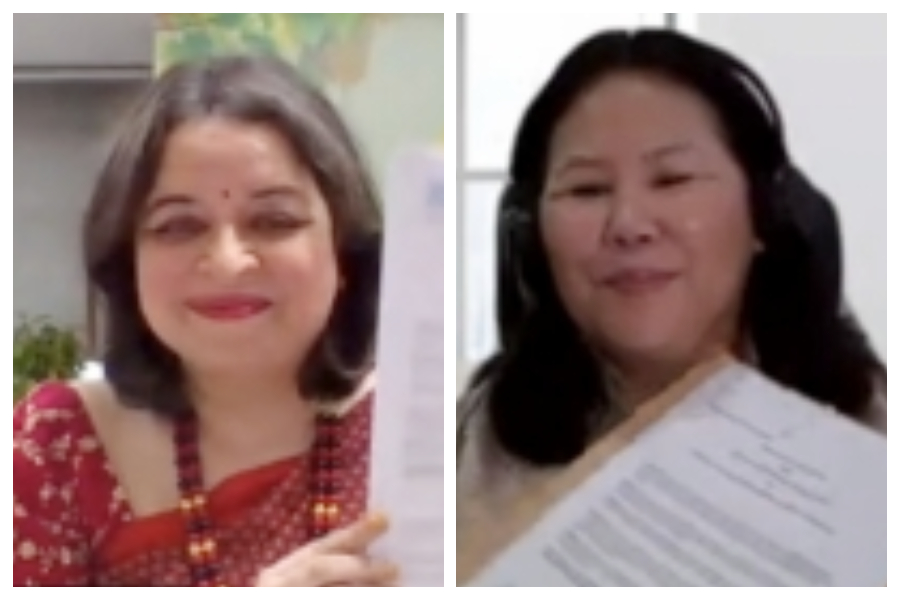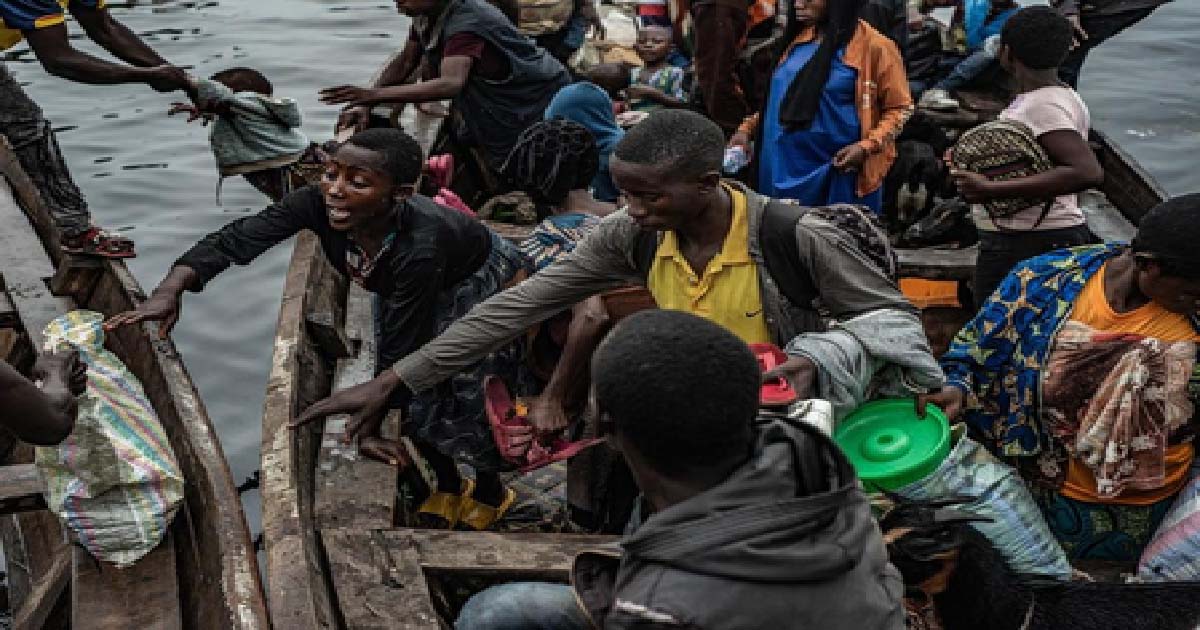International News
UNEP signs MoU with Mah govt for implementing climate change actions

The UN Environment Programme (UNEP) has signed a Memorandum of Understanding (MoU) with the Maharashtra government to support its ‘Majhi Vasundhara’ campaign, an initiative with regard to the energy and environmental dimensions of sustainable development.
“The beginning of a new partnership between UN Environment Programme and the Government of Maharashtra will support the state in the implementation of climate change mitigation and adaptation measures,” said a statement from UN office on Saturday.
The MoU was signed on Friday.
‘Majhi Vasundhara’ (literally, My Earth) is an initiative of the Government of Maharashtra’s Environment and Climate Change Department to empower citizens with knowledge on the impacts of climate change and environmental issues and to encourage them to make a conscious effort towards improvement of the environment.
Speaking for the government of Maharashtra, Cabinet Minister of Tourism, Environment and Protocol, Aditya Thackeray said: “We should start to consider all possible avenues to get to Net Zero at the earliest. Over the next few months, Maharashtra will evaluate the investment prospects that will be required to steer Maharashtra’s economy towards net zero. We have an imperative to act now.”
UNEP will support the state in educating and mobilising youth on plastic pollution and marine litter through UNEP’s Tide Turner Challenge across all educational institutes in the state of Maharashtra. Under the partnership, UNEP will support the Maharashtra government on various clean energy initiatives and in its efforts to develop a strategy for carbon neutral development in line with the Government of India’s vision.
“The time is right for Maharashtra to lead the drive in a clean energy transition with its recent renewable energy policy being an important step.”
This can pave the way for industry to make this shift, alongside the financing opportunities that are coming in tandem. Clean energy, and sustainability as a whole, is growing as an opportunity for industry. “There is a global trend in which frontrunners are occupying a niche in different markets, not just in the energy sector, but in sectors such as transport, agriculture, electronics, chemicals, buildings and construction, textiles, to those taking advantage of what a circular plastics economy can offer. Maharashtra is well placed to take advantage of this transition,” said Director, Economy Division, UNEP, Sheila Aggarwal-Khan.
“In this Decade of Action to achieve the Sustainable Development Goals, we are pleased to see this collaboration between UN Environment Programme as a member of the UN Country Team in India and the Government of Maharashtra, which will help inculcate climate consciousness and green values across communities and especially the youth. This is an important step to enhance sustainable interaction between people and their environment, aligning respect for the Earth with prosperity,” Shombi Sharp, UN Resident Coordinator in India, said.
The UNEP is the leading global voice on the environment. It provides leadership and encourages partnership in caring for the environment by inspiring, informing and enabling nations and peoples to improve their quality of life without compromising that of future generations.
International News
Nearly 25 million people facing acute food insecurity in Congo: UN

United Nations, Nov 13: Nearly 25 million people, over 20 per cent of the population, are facing high levels of acute food insecurity in the Democratic Republic of the Congo (DRC), a UN spokesperson said.
The DRC remains one of the countries most affected by food insecurity, with the situation particularly severe in the east, said Stephane Dujarric, spokesperson for the UN secretary-general, at a daily briefing on Wednesday.
According to the latest Integrated Food Security Phase Classification analysis, the number is projected to rise to nearly 27 million people in the first half of 2026, he said.
Dujarric said the UN Office for the Coordination of Humanitarian Affairs (OCHA) remains deeply concerned about continued attacks against civilians in Beni and Lubero territories in North Kivu and also in Ituri province, with more than 1,000 people reportedly killed in the two provinces since the beginning of this year.
The impact on health services has been devastating, with at least six facilities attacked since the beginning of 2025 and a total of at least 28 health sites affected by armed attacks since 2024, said the spokesperson.
He said OCHA reiterated its call on all parties to respect international humanitarian law and ensure the protection of civilians and civilian infrastructure.
Since January, the security situation in eastern DRC has worsened sharply amid renewed fighting involving the March 23 Movement rebel group, which seized several key towns, including Goma and Bukavu, Xinhua news agency reported.
Humanitarian agencies say the escalating violence has displaced hundreds of thousands of civilians, deepening an already dire crisis.
Earlier on October 14, the government of the DRC and the March 23 Movement (M23) rebel group had signed an agreement in Doha to establish a ceasefire monitoring and verification mechanism, under the facilitation of Qatar.
International News
ECI hosts global delegates during Bihar elections under poll visitors’ initiative

New Delhi, Nov 6: As polling for the first phase of the Bihar Assembly elections got underway on Thursday, the Election Commission of India (ECI) on Thursday welcomed 16 delegates from six countries under its International Election Visitors’ Programme (IEVP).
The initiative, aimed at fostering global cooperation and transparency in electoral processes, saw participants from Colombia, Indonesia, Thailand, The Philippines, Belgium, and South Africa witnessing the on-ground arrangements of one of the world’s largest democratic exercises.
“Under the International Election Visitors’ Programme (IEVP) of the ECI, 16 delegates from 6 countries – Colombia, Indonesia, Thailand, Philippines, Belgium, South Africa are witnessing the never before arrangements made by the ECI,” the poll panel said on X.
According to the ECI, the IEVP 2025 began earlier this week at the India International Institute for Democracy and Election Management (IIIDEM) in New Delhi on November 4.
The inaugural session was chaired by Chief Election Commissioner Gyanesh Kumar and Election Commissioner Vivek Joshi, who interacted with the visiting delegates and briefed them about India’s robust electoral framework.
During the Delhi leg, participants were given a detailed presentation on the functioning of Electronic Voting Machines (EVMs), voter roll management, and logistical preparedness.
“IEVP includes a two-day tour of Bihar from November 5-6, 2025 where the participants will visit the EVM dispatch centres and witness the actual polling on November 6, 2025,” the ECI said in its Press note earlier.
The IEVP is a flagship program of the ECI for international cooperation and engagement with the Election Management Bodies (EMBs) of other countries and international organisations.
The IEVP, launched in 2014, serves as the ECI’s flagship platform for international engagement with Election Management Bodies (EMBs) and global democratic institutions. Through this programme, India showcases its electoral best practices and fosters mutual learning with partner nations.
This year’s edition underlines India’s growing role as a leader in electoral management, with the ECI using the Bihar polls as a live demonstration of its operational scale, transparency, and integrity.
Crime
D-Syndicate looking to expand narco trade into Southern and Northeastern routes, warn Intelligence agencies

New Delhi, Oct 30: In recent months, the Narcotics Control Bureau (NCB) has been cracking down heavily on the Dawood Ibrahim-linked drug network in India.
The arrests of Danish Chikna and Mohammed Salim Sheikh have dealt major blows to the Dawood network, and this has prompted the syndicate to look for newer avenues.
As Intelligence agencies continue to focus heavily on the networks in Maharashtra and neighbouring states, the D-Syndicate is looking to expand its networks in the northeastern and southern states of India.
Action would be taken similarly in these parts of the country. However, it is necessary to bust the networks in states such as Maharashtra and Gujarat, which have been the traditional playground of the syndicate for a long.
While Dawood Ibrahim has diversified his business in various parts of the country, the command centre remains in Maharashtra.
The people working for the network in this sector control the businesses across the country, and hence, breaking their backs first is important. This would eventually lead to the weakening of the networks in other parts of the country.
Operations in the northeastern and southern states are currently overseen by Haji Salim, an ISI stooge and a member of the Dawood network.
Salim has been playing a big part in the D-Syndicate after Dawood’s right-hand man, Chhota Shakeel, has gone mysteriously quiet.
With Dawood’s brother Anees Ibrahim put in charge of the International wing, which does business mostly in African nations, the onus of the Indian markets has largely fallen upon Salim.
According to Intelligence agencies, the ISI and syndicate have now instructed Salim to focus entirely on the southern and northeastern sector as they feel that there is a major potential.
The syndicate sees potential in the northeast owing to the existing routes from Myanmar. With Bangladesh opening up completely to the ISI, the syndicate sees further potential in this sector.
In the South, the syndicate’s network exists. However, this network has largely focused on smuggling drugs out of the country. The narcotics would first be smuggled into the southern states, especially Kerala and Tamil Nadu, and later, to the international markets such as Thailand through the Sri Lanka route.
An Intelligence Bureau official says that the syndicate is also looking to bring in more drugs through Sri Lanka before distributing it in the Indian market.
While the international market is huge for the syndicate, it is not ready to let go of India, as demand is huge.
The syndicate not just wants to cover its losses in Maharashtra, but also the ones it is incurring in Punjab.
Several attempts to bring in drugs through the Punjab route using both couriers and drones are failing owing to heavy scrutiny and security. Hence, the Dawood network wants to take maximum advantage of the southern route so that it can smuggle drugs in huge quantities and then distribute them to the Indian market.
To bring in drugs from the international market, the syndicate would use the route from Sri Lanka. The network would look to smuggle the consignment into Tamil Nadu and Kerala before supplying it into the Indian market.
According to officials, the network feels that this would be an easier route, as most of the consignments in the Indian market will be transported via land route.
The scrutiny at the southern international borders is relatively less when compared to the borders along Punjab or Jammu and Kashmir. Further, using the land route to smuggle drugs into India would also attract less scrutiny, and the syndicate hopes there would be more hits than misses.
Another official also pointed out that the D-Syndicate is also tapping into the illegal immigrants who have settled in South India in huge numbers. They could be used as carriers to supply the drugs into the Indian markets, officials also warned.
-

 Crime3 years ago
Crime3 years agoClass 10 student jumps to death in Jaipur
-

 Maharashtra1 year ago
Maharashtra1 year agoMumbai Local Train Update: Central Railway’s New Timetable Comes Into Effect; Check Full List Of Revised Timings & Stations
-

 Maharashtra1 year ago
Maharashtra1 year agoMumbai To Go Toll-Free Tonight! Maharashtra Govt Announces Complete Toll Waiver For Light Motor Vehicles At All 5 Entry Points Of City
-

 Maharashtra1 year ago
Maharashtra1 year agoFalse photo of Imtiaz Jaleel’s rally, exposing the fooling conspiracy
-

 National News1 year ago
National News1 year agoMinistry of Railways rolls out Special Drive 4.0 with focus on digitisation, cleanliness, inclusiveness and grievance redressal
-

 Maharashtra12 months ago
Maharashtra12 months agoMaharashtra Elections 2024: Mumbai Metro & BEST Services Extended Till Midnight On Voting Day
-

 National News1 year ago
National News1 year agoJ&K: 4 Jawans Killed, 28 Injured After Bus Carrying BSF Personnel For Poll Duty Falls Into Gorge In Budgam; Terrifying Visuals Surface
-

 Crime1 year ago
Crime1 year agoBaba Siddique Murder: Mumbai Police Unable To Get Lawrence Bishnoi Custody Due To Home Ministry Order, Says Report












